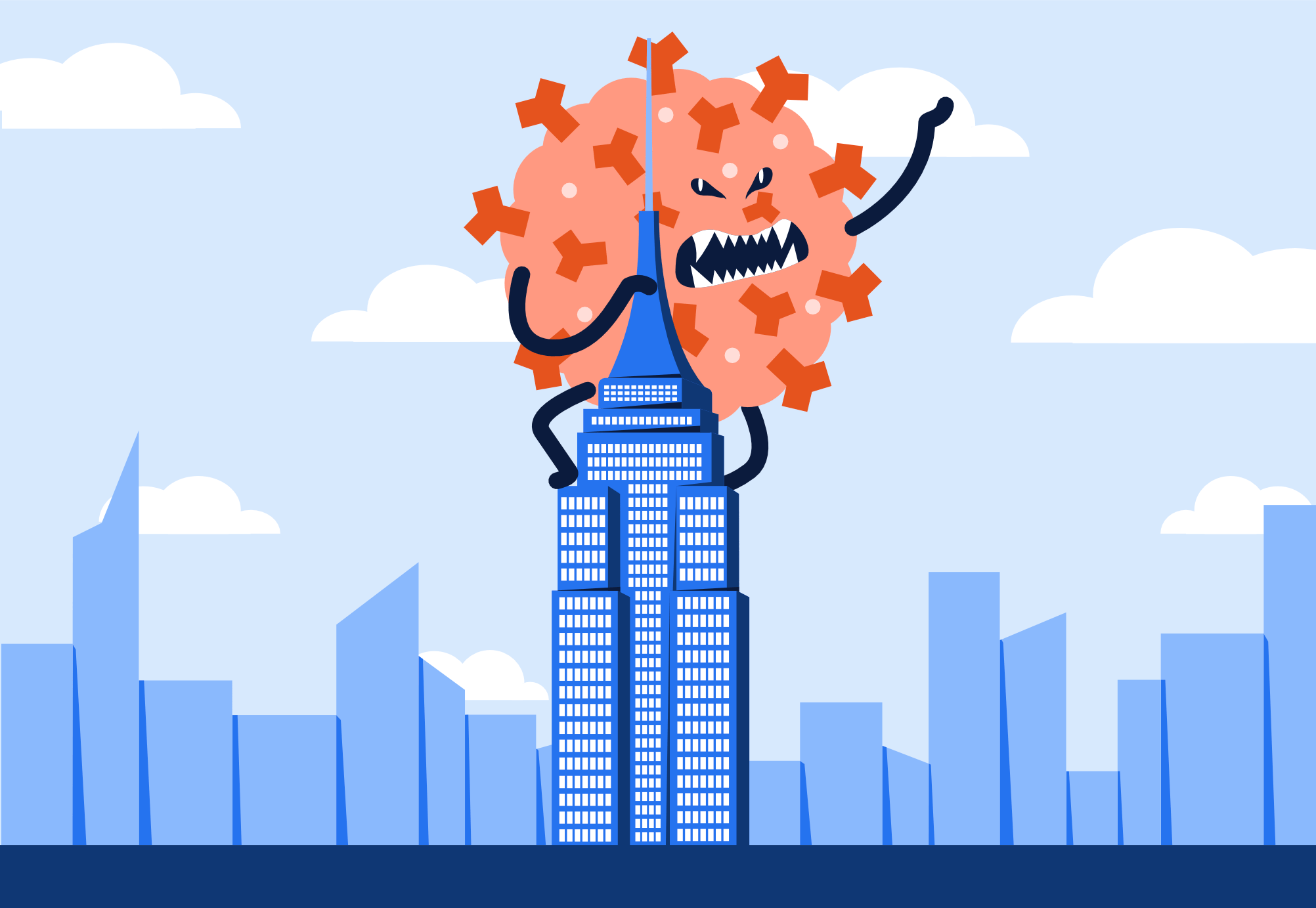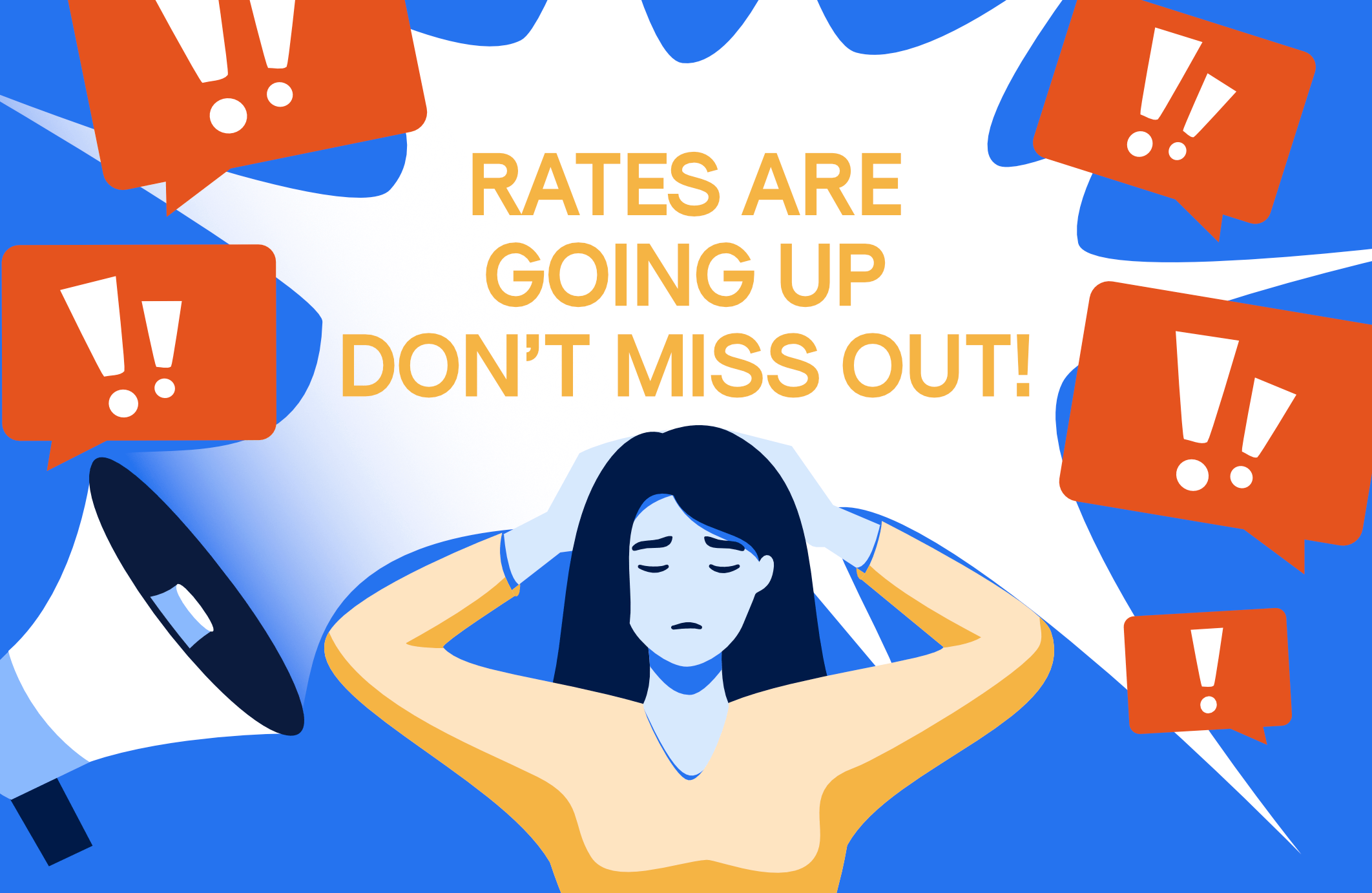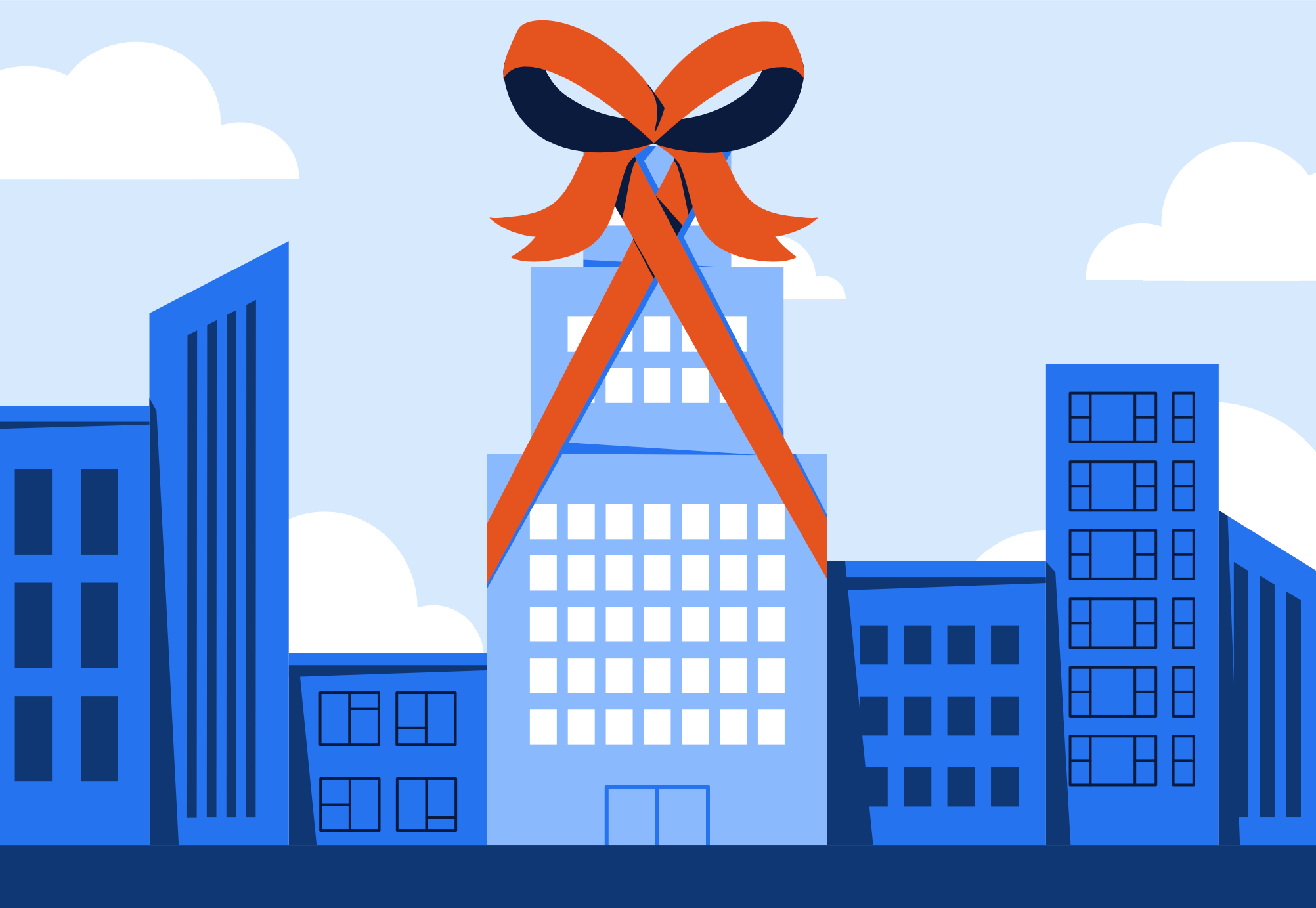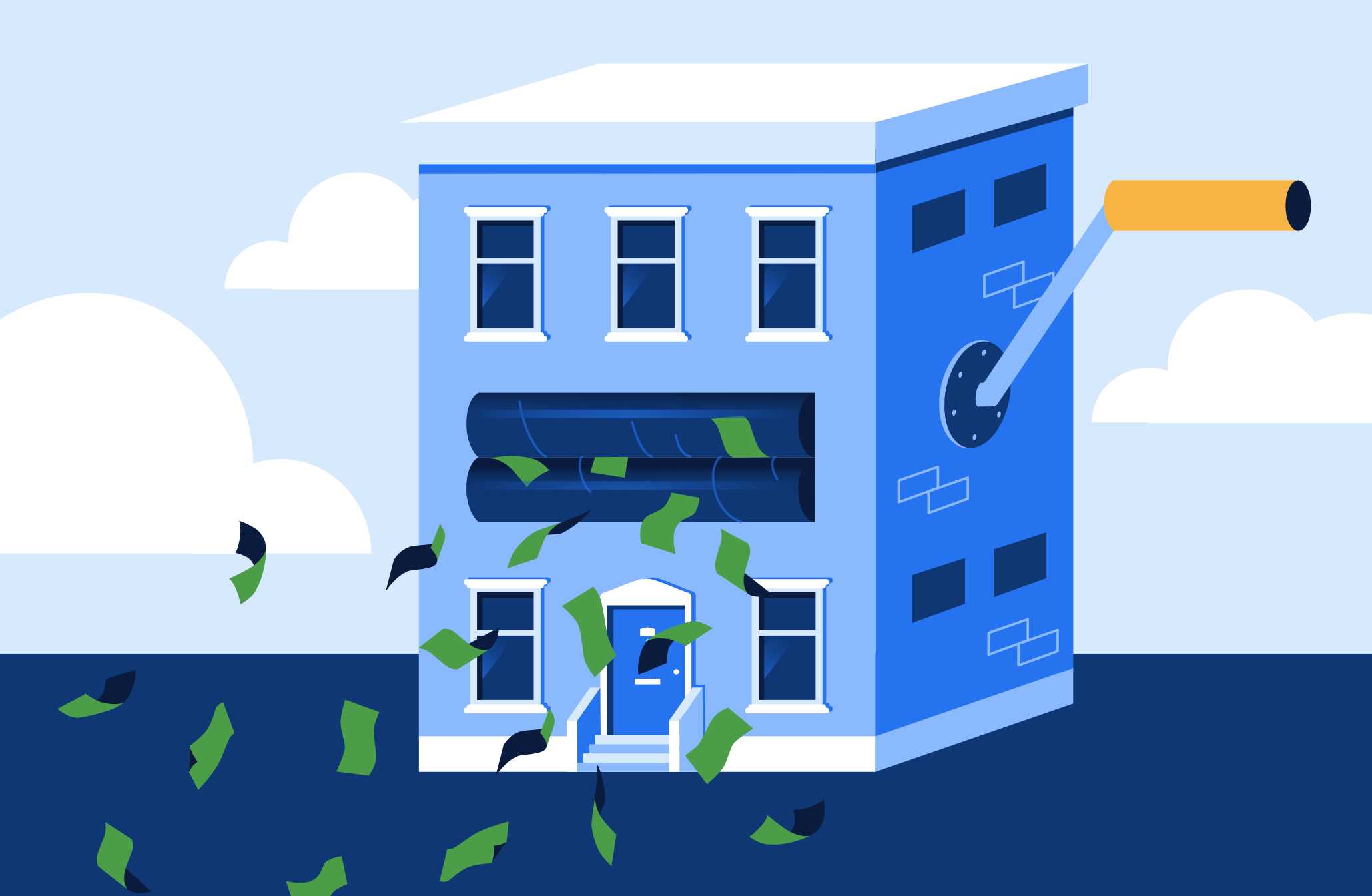Author's update: With the NYC real estate market is getting back to normal, our last update for this post will be June 2021. For all of the latest stats, check out our monthly updates on our YouTube page.
If you’re at all interested in the NYC real estate market, there’s one question that keeps coming up - how is coronavirus impacting NYC real estate? It’s safe to assume the overall impact is not good but how worried should buyers and sellers be?
Coronavirus’ Current Impact on the NYC Real Estate Market
The NYC real estate market came out of lockdown on June 22nd with Phase 2 of the reopening plan and in-person showings are now allowed again.
During lockdown, only "virtual showings” were allowed which generally meant a video walkthrough or a series of 360 camera shots. They were better than nothing but the vast majority of buyers still needed to physically walk a property before putting down six or seven figures. That was the #1, 2 and 3 problem for the market. Even with everything going on, transaction count would have been much higher if buyers could have safely visited apartments.
While in-person showings are back, the market is far from normal. In order to confirm an in-person showing, two REBNY forms are required - the Limitation of Liability Form and Health Questionnaire Screening Form. Many individual buildings also have their own forms and strict rules for showings.
The inability to see properties during lockdown resulted in a dramatic decline in transaction count. Normally, Manhattan sees about 1,000 contracts signed in April and May but this year they averaged less than 200. The buyers in many (or even most) of those deals saw the property and/or made their offer earlier in the year.
Ever since the market reopened in late June, we've seen steady improvement and over the last few months, demand has been very strong. Manhattan is starting to mirror suburban housing markets across the country and most recently in April and May, we saw record levels of contract activity.
Yoreevo has seen this in our daily operations. We're being told units have accepted offers far more often. For all the details, check out Yoreevo's May 2021 Manhattan Market Update [Video].

In addition to higher contract activity, the other big story has been lower inventory. There were 6,938 listings on the market at the end of May - the lowest levels since right after lockdown ended in June 2020. Lower inventory levels are starting to limit buyers' choices and push pricing up in neighborhoods with less inventory.

Toll Brothers is a public company and NYC developer so their earnings calls have provided a glimpse into the new development market. Generally, they seem to be experiencing trends similar to those of the overall market.
- May 28th, 2020 - Toll Brothers NYC purchase agreements from mid-March through April were down 96%! Things had gotten slightly better since and May agreements were down "only" 86%.
- August 25th, 2020 - Their NYC operations were "not doing well" and they considered themselves fortunate to have a low level of capital invested in the city.
- December 8th, 2020 - Things seem to be turning around. Toll Brothers' CEO said, "I am very encouraged by the last 6 weeks of activity in Manhattan. I am not telling you it's back, but it is improving. We're hearing that buyers, with the talk of vaccines, are now thinking about living in New York. We're hearing a few stories of some that went to the suburbs, that are coming back to take a look."
- February 24th, 2021 - Continued improvement - "We have 33 agreements in the first quarter coming out of New York City, five buildings and that includes Jersey City, Hoboken and Manhattan, and that’s similar to the sales we had a year ago pre-COVID. So, I’m very pleased with the improvement we’ve seen in New York recently."
- May 26, 2021 - "With respect to our City Living urban condo business, we are very pleased with the renewed demand coming out of New York City."
It's important to keep in mind the new development market has been weak for years. While COVID certainly didn't help, developers were already going to be in for a rough few years.
New York City is seeing a similar trend as China, albeit a bit more drawn out. The chart below is from Capital Economics and shows real estate transactions in 30 major Chinese cities compared to 2019’s average. While the fall was dramatic with almost no transactions in February, activity recovered to previous year levels in June, just four months later.

Will Coronavirus Hurt NYC Real Estate Prices?
So transactions are down dramatically. What about prices? Here we have much less information because prices are reported with a significant lag and even with COVID deals starting to hit the public record, there just aren't many data points.
For example, if you're looking at one bedroom, elevator co-ops in Gramercy, there have only been a handful of post-COVID closed transactions with prices reported on ACRIS.
That being said, we know you're here for numbers! So what have we seen?
During lockdown, it seemed like prices were down 2-5%. The higher end of that range was on new development. Sponsors are pretty rational. They looked at their spreadsheets, calculated carrying costs, factored in elevated risk and concluded $0.95 today was as good as $1.00 down the road.
Meanwhile, sellers in the resale market held firm. During lockdown we weren't seeing noticeable discounts. That’s partially because sellers are always slow to react to a weaker market but more importantly, they’re better off waiting as long as things go back to normal. Unlike new development, they can also get utility out of the apartment by living in it while they wait.
Once the market reopened, we saw a big increase in inventory. As seen in the chart above, listings took off in June, giving buyers a lot of choices and limiting urgency.
The general buyer mindset is if they miss any individual property, no big deal. There are tons more behind it so there's no need to be aggressive. This is why pricing of commoditized apartments is so weak. It's tough to stand out as a cookie cutter 1BR or 2BR in Midtown or the Financial District. Pricing for these units is down around 10%.
Meanwhile, if you have something that's hard to find - say a renovated West Village apartment with outdoor space - there is still plenty of interest. Those properties are selling quickly, sometimes at a premium to pre-COVID levels.
And while this post is focused on Manhattan, it's worth noting the Brooklyn real estate market has been very strong and prices are generally flat to up.
You may have seen the national housing market is extremely strong. Many suburban markets are not only seeing a rebound, they're seeing bidding wars. Buyers have rushed back into the market only to find limited inventory so competition has been fierce. The issue facing NYC is with offices closed, there just aren't many buyers physically in the city. We don't know how much the market will improve once people come back but it will certainly will.
While not a pandemic, we’ve heard a lot of comparisons to 9/11. Then too there was a sudden, non-financial shock to the economy. While there are certainly similarities, we don’t think that's a fair indication of what’s to happen. Below you can see Manhattan real estate prices since 1999 and there wasn’t even a dip in 2001.

The big difference between coronavirus and 9/11 is most of the economy was fine after 9/11. Of course certain industries such as travel were hit hard but there was not the widespread shutdown that we’re facing today.
Job losses are also much higher due to COVID. Weekly initial jobless claims previously peaked at 517,000 in late September 2001. From mid-March through May, that averaged 4,076,000 per week and totaled over 40 million. There is hope many of these jobs will come back quickly but a complete recovery will take time.
The good news for NYC real estate is some of the city’s largest industries such as finance and technology have avoided widespread layoffs so far.
Coronavirus has resulted in one positive for the real estate market - lower mortgage rates. Nationwide, 30 year fixed mortgage rates are a full percentage point lower than they were coming into the year.
Shortly after COVID, we saw the difference (or "spread") between the 10 Year US Treasury and mortgage rates increase significantly but it has since declined to normal levels as shown in green in the chart below.
For more information, check out our post on interest rates.

How is Coronavirus Impacting Current and Future Deals?
Along with fewer deals, the other known impact coronavirus is having on the NYC real estate is deals are getting more complicated. Pretty much every step between the accepted offer and the closing table has gotten trickier.
Due Diligence - There’s really only one part of due diligence that’s a problem - board minutes. Before coronavirus, board minutes were never sent out under any circumstances. They were treated as top secret documents and attorneys had to physically go to management and review them in person. If management's office is closed, obviously that’s no longer an option.
As a compromise, many management companies are now sending out minutes electronically under a non-disclosure agreement. If that’s not an option, attorneys can also submit a questionnaire (for a fee) to address their specific questions.
Appraisals - While most of the lending application is done digitally, the appraisal typically involves someone physically going to the property to verify its condition, size and attributes. As the market has reopened, this has been less of an obstacle but some banks are still doing "drive-by" appraisals which are based on publicly available information and a literal drive by the property.
Board Interviews - A typical co-op board interview is the opposite of social distancing - a bunch of people in a room meeting one another. Almost all boards are now conducting interviews over video chat.
Walkthroughs - As the market has reopened, walkthroughs have generally gone back to normal. The building may just ask for minimal attendance and everyone's information for contact tracing.
Closing - Closings in the time of COVID could be a whole blog series. Attorneys generally coordinate the closing so if you are in contract and wondering what needs to happen, you should check there first. However we can say closings are often the biggest incremental headache these days.
Management offices are still closed, funds need to be wired, notaries need to be done online, safety precautions need to be taken. If one surprise comes up, it can postpone the closing. Co-ops are more difficult than condos and condos are more difficult than houses but none are easy.
All of these comments are far from universal so before pursuing a transaction, you should check with your whole team - real estate agent, lender and attorney. If there are any potential hiccups, you should be aware of them from the start and your attorney should make sure you are protected in the contract.
Should You Buy NYC Real Estate During Coronavirus?
Coronavirus has taken what’s always a big decision and made it even more fraught. Before considering a purchase in such a chaotic environment, there are a few questions you should ask.
- Is your job stable? If there is any chance you’ll be laid off, even temporarily, you should not be buying an apartment.
- Did you see the property? It may be tempting to buy off a virtual tour but you don't want buyer’s remorse on such a large purchase. There is more latitude here if you’re thinking about buying an investment property.
- Have you spoken to your lender? Some lenders have tightened their underwriting standards so you’ll want to make sure you’re still able to get the mortgage you expect and need.
- Are you benefiting by acting now? Pricing is down but still a far cry from firesale levels. Lower mortgage rates are one clear reason to buy now but regardless of the benefits, if you're going to lose sleep making such a big decision among so much uncertainty, it may be better to wait.
If you can answer yes to all of those questions, you’re in business. Pay no mind to friends who say you’re crazy to buy. If everyone thought buying was a good idea, there wouldn’t be any deals available. If you’re financially secure and confident in your purchase, it’s a great time to buy the NYC apartment you've always wanted.
To get the latest information and dive into the details, contact us at info@yoreevo.com or 212-365-0151. We’ve gathered tons of market data and on the ground anecdotes to help you make an informed decision and, as always, our buyers receive NYC’s largest commission rebate, averaging more than $24,000, back at closing!



